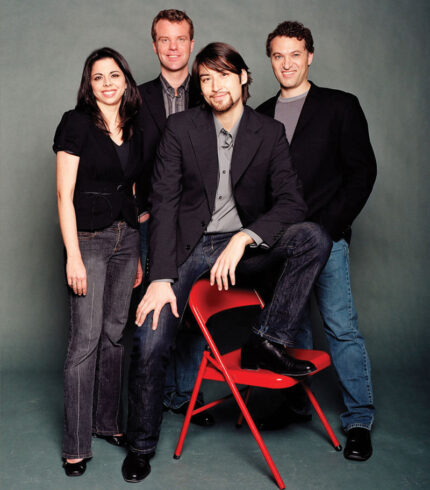After a broken string, a memorable afternoon with the Pacifica Quartet

Sometimes an unplanned event can tell a lot about musicians and their rapport with audiences. Such was the case Sunday afternoon at Mandel Hall when the Pacifica Quartet’s second violinist Sibbi Bernhardsson broke a string halfway through the first movement of Mendelssohn’s Op. 12 quartet.
As he went offstage for a quick repair, cellist Brandon Vamos gestured toward the water glasses on stage for the George Crumb work to follow, asking “Would anyone care for a drink?” A few jokes and exchanges with the audience later, Bernardsson returned and the concert resumed.
The Pacifica members may have shown relaxed informality during the unexpected interruption, but their intensely focused performing style is anything but laid back. Artists-in-residence at the University of Chicago and ensemble-in-residence at the University of Illinois in Urbana, the group just added a regular New York venue as well, succeeding the retired Guarneri String Quartet at the Metropolitan Museum of Art. Yet the youthful musicians seem to thrive on peripatetic concertizing as was clear by the extraordinarily involving performances heard Sunday at the University of Chicago.
As shown in their CD set of Mendelssohn’s complete quartets (Cedille), the group’s uncommonly well-balanced sound is especially well suited to this year’s anniversary composer. Led by violinist Simin Ganatra’s gleaming precision, the Pacifica’s blend of quicksilver virtuosity and refined brilliance fits Mendelssohn like a well-tailored glove.
Even with the unplanned interregnum, the Pacifica’s performance was polished and first class, bringing out the caprice-like charm of the Canzonetta as well as the headlong velocity of the middle section. The Andante was beautifully rendered, expressive yet the emotion kept in scale. Mendelssohn was one of the first to appreciate Beethoven’s late quartets when many contemporaries were still baffled, and that influence is clear in the stormy gear-shifts of the finale. The Pacifica gave the sturm und drang apt bite and impact while never losing an essential elegance and geniality, with the glowing quiet coda sensitively assayed.
The Pacifica’s Urbana colleague, cellist Dmitry Kouzov, joined the group for Schubert’s String Quintet and fit into the ensemble effortlessly. The performance sustained the long expansive melodies with finely calibrated focus and dramatic intensity, the dark shadows given firm impact as with the sudden dislocating explosion in the first movement. The heart-easing lyricism of the Adagio was warmly communicative without getting soupy, and the players conveyed the ruminative melancholy of the Scherzo’s middle section, some rare errant intonation in the opening section apart. Still, an outstanding performance of Schubert’s glorious Quintet. Too bad about the lack of proofreading in the program notes, which listed only three movements for both the Mendelssohn and Schubert works.
The most compelling performance of the afternoon came with the centerpiece, George Crumb’s Black Angels. Marking Crumb’s 80th birthday last week, his characteristically imaginative and resourceful 1970 political protest for string quartet is as close to being a regular repertoire piece as any of the American composer’s music.
I don’t expect to ever hear a finer performance of Black Angels than that presented by the Pacifica Quartet Sunday in Hyde Park. Not only did the group surmount the intense technical demands of the instrumental doubling—maracas, tam-tam, bowing water-tuned crystal glasses, etc.—but they brought a hair-trigger tonal sensitivity and expressive eloquence to Crumb’s singular music.
Effects that in lesser hands can seem gimmicky made for a haunting and transcendent experience as Crumb’s pointillist Impressionistic reflection of 1960s civic unrest slowly unfolded with a sense of timeless inevitability. The dirge-like marches, wispy violin tendrils, and shouts in different languages were all rendered by the Pacifica members with the same scrupulous balancing they bring to Haydn, and an infinitesimally graded array of dynamics and tonal hues. The various sounds and mingled timbres made for an unearthly, slowly mutating sonic meditation, at times almost subliminal in effect.
No encore was offered but after this remarkable afternoon of music, none was needed or expected. Let’s hope their added New York venue doesn’t tempt the Pacifica Quartet away from Chicago where they remain a civic musical treasure.
Posted in Performances




